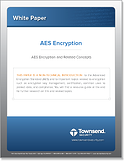AES Encryption & Related Concepts |
In 2012, we saw several large data breaches occurring to website-based companies such as LinkedIn, eHarmony, and Last.fm. These breaches exposed millions of passwords and led us to ask the question, are emails and passwords personally identifiable information (PII)? Because people tend to use email addresses and passwords across multiple website accounts that might contain information such as first and last names, physical addresses, and credit card information, we suspect that if email addresses and passwords aren’t considered PII by everyone today, they soon will be.
Last year I wrote a blog article on the states that had passed some sort of data privacy law, and how widely each state’s definition of PII varies:
(Aug. 8th, 2012) “A significant number of states just lifted verbatim what other states had written into law. A rough guess is that about one third of the states had almost identical data privacy laws.
But the remaining two thirds of the regulations varied greatly, even in defining what PII is. It was common to consider the First Name and Last Name in combination with a Social Security number, bank account number, or driver's license number as information that constituted PII that needed to be protected. But after reading and collating all 45 states, I found 41 data items that were considered PII! In addition to the standard data items, I found passport numbers, military IDs, medical numbers, email addresses, and much else. I even found definitions of PII that went something like this: ‘Any information in aggregate that can identify an individual must be protected.’ It was a lot of ground to cover.
So, should you be protecting email addresses? Absolutely!”
This is something I believe not only still holds true, but will become even more important in the future. Using encryption to protect log-in information and passwords is the best way any one company can protect that information. Of course, using good encryption key management is also a critical part of that process. Even if a hacker gets hold of encrypted data, they cannot get access to that data unless they also find the encryption keys.
For more information, download our white paper "AES Encryption and Related Concepts" and learn about how proper encryption and encryption key management work together to secure your data.



 Draft versions of a Federal data privacy and breach notification law have been in existence for over a year. The House of Representatives passed a version some months ago, and two versions have been working their way through the US Senate. This week saw a significant advance in the US Senate as the judiciary committee under Senator Patrick Leahy’s leadership passed a version out of committee with a vote along party lines. I think Senate Bill 1151 represents a significant step forward towards a federal law that will replace all of the approximately 45 state laws on breach notification. The law still has to be reconciled with the House version, and a lot can change in the process, but there is general agreement in the business community that one Federal law is preferable to a lot of different state laws. So I think there is a good chance that a Federal privacy law can pass.
Draft versions of a Federal data privacy and breach notification law have been in existence for over a year. The House of Representatives passed a version some months ago, and two versions have been working their way through the US Senate. This week saw a significant advance in the US Senate as the judiciary committee under Senator Patrick Leahy’s leadership passed a version out of committee with a vote along party lines. I think Senate Bill 1151 represents a significant step forward towards a federal law that will replace all of the approximately 45 state laws on breach notification. The law still has to be reconciled with the House version, and a lot can change in the process, but there is general agreement in the business community that one Federal law is preferable to a lot of different state laws. So I think there is a good chance that a Federal privacy law can pass.

